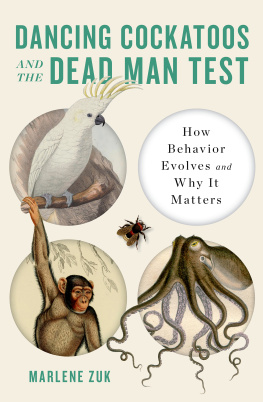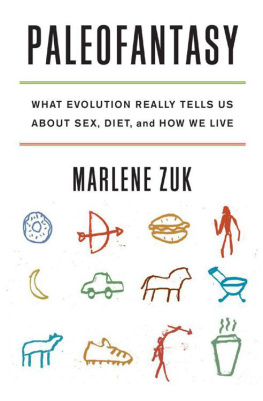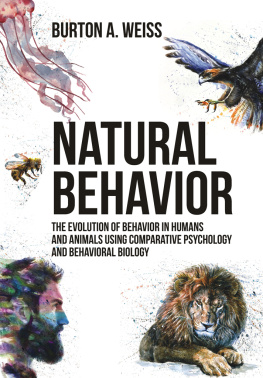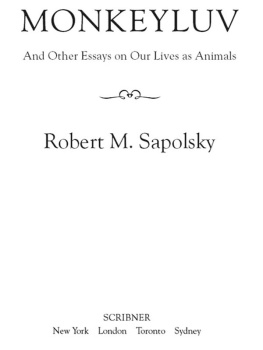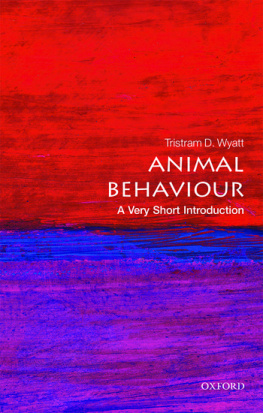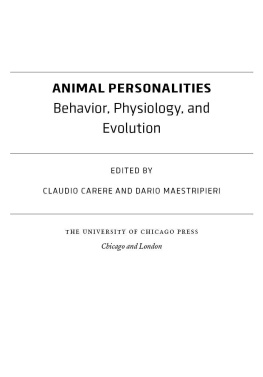Contents
Guide

DANCING COCKATOOS
AND THE DEAD MAN TEST
How Behavior Evolves
and Why It Matters
MARLENE ZUK

Contents
Narwhals and the Dead Man:
Why Is Behavior So Hard to Define?
Snakes, Spiders, Bees, and Princesses:
How Behavior Evolves
Clean-Minded Bees and Courtship Genes:
The Inheritance of Behavior
Raised by WolvesWould It Really Be So Bad?:
The First Domestication
Wild-Mannered:
The Other Domestics
The Anxious Invertebrate:
Animal Mental Illness
Dancing Cockatoos and Thieving Gulls:
Bird Brains and the Evolution of Cognition
A Soft Spot for Hard Creatures:
Invertebrate Intelligence
Talking with the Birds and the Bees. And the Monkeys.:
Animal Language
The Faithful Coucal:
Animals, Genes, and Sex Roles
Protect and Defend:
Behavior and Disease
A colleague of mine used to have two stock answers when the passenger next to him on an airplane asked what he did for a living. If he was happy to talk to the person, he said he was a marine biologist, which spurred all kinds of inquiries about ocean animals and anecdotes about snorkeling vacations. If he wasnt interested in conversation, he said he was an evolutionary biologist, which usually resulted in the person smiling tightly and returning to their electronic device.
Im usually not quite so premeditated about my answer to that question, though I have noticed that if I say I study insects (which is true), people will ask me how to kill the pests in their garden, or maybe about beekeeping, which I know nothing about. If, on the other hand, I say that I work on animal behavior (which is also true), I get lots of stories about peoples pets and questions about the latest nature documentaries. They often want to talk about how much smarter animals are than we give them credit for, although admittedly that usually goes for animals other than insects. Either way, I like talking to people about animals, and I am always interested in hearing how they interpret the behavior of the creatures around them.
Often, the conversation turns to how much animals are like humans, though again this topic usually excludes insects. People have always wanted to draw parallels between our lives and those of animals. Author Helen Macdonald eloquently points out, The deepest lesson that animals have taught me: how easily and unconsciously we see other lives as mirrors of our own. Of course, as she goes on to say, Animals dont exist in order to teach us things, but that is what they have always done, and most of what they teach us is what we think we know about ourselves.
At the same time, what we know about ourselves these days is continually infused with the latest discoveries about where our behavior comes from, and particularly about how so many of our most human characteristics are innate, and have a basis in our genes. Headlines are full of declarations like: Our Politics Are in Our DNA, or To Move Is to Thrive. Its in Our Genes. A paper in the prestigious scientific journal Proceedings of the National Academy of Sciences was titled Trust Is Heritable, Whereas Distrust Is Not. Even dog ownership was said to have a genetic basis.
Britains Telegraph screamed in June 2019: There Is No Point Sending Your Children to Eton Because Education Is in Your Genes, Says Geneticist. The article was reporting on work by Robert Plomin, who also said that while environmental influences are important, too... they are largely unsystematic, unstable and idiosyncratic. Sarah Knapton, the newspapers science editor, flatly stated that Plomin, a professor of behavioral genetics at Kings College London, had shown that academic success is written in the genes. Not suggested, mind you, shown. Even the #MeToo movement is, at its heart, disputing the long-held notion that men are naturally inclined to hit on women, and whether there is anything we can really do about it. And when people talk about whats natural, or inherent, or fixed, or instinctive, to use just a few of the synonyms that are bruited about, they mean what biology, or our genes, determines.
By contrast, others claim the environment is all powerful. Prominent functional medicine practitioner, Chris Kresser, writes in his blog, At one time scientists believed our DNA held the key to preventing and reversing disease. But we now know that our environmentnot our genesis the primary driver of health and longevity. It then presents examples of pet behavior, neatly divided into learned or innate.
The Greek Not-So-Blank Slate
All of this brouhaha about whats learned and whats cultural is, of course, the old nature-nurture debate. Questions about what we learn and what we inherit have long dominated our public conversations about equality, about why our talents and predilections vary among us and where they come from. Are we blank slates, or are our lives and actions determined long before we are born, by our genes and their effects on our bodies and brains? People have been trying to answer this question for centuries if not longer, and the question has existed in some form even before we knew there was such a thing as a gene. Scholars have long argued about the nature of innateness, a concept that, as British philosopher Richard Samuels says, has led a busy life. Philosopher Paul Griffiths, whose work I will return to in
Even Aristotle and Plato have roles here, though the question at hand was not where our behavior comes from, but the closely related issue of how knowledge itself came to be. According to Aristotle, we use our senses to comprehend the world, which means that learning, or the environment, was sufficient to explain how we operate. Plato disagreed, claiming that we do not acquire information about the world but instead are endowed, or born, with it. Prominent philosophers have weighed in on one side or the other over the ensuing centuries, but one thing remains clear: we havent got this question sorted out by a long shot.
The ancient Greeks had no notion of genes, of course, though they obviously knew that parents passed on characteristics to their offspring. And indeed, the argument doesnt depend on genes. Psychologists, particularly those interested in child development, have essentially renamed the conflict as the nativist-empiricist debate, which as far as I can tell is the same old genetic versus environmental wine in new bottles, though the focus isnt on DNA so much as on how human development uses information from different sources. The argument is also related to the idea of essentialism, which I will discuss in more detail in later chapters. Briefly, from the essentialist viewpoint every being has an essence that it carries with it and that transcends its experiences and other changes, such as growth and development. Worms are thus always wormy, and nothing that happens can make them less so. Squaring this idea with the evolution of everything from fish to badgers to people from worm-like ancestors, if not actual worms, seems a bit difficult, but the nativists suggest that evolution confers people with primitives or core abilities in things like language and social interactions.
Those click-baiting headlines and our fascination with the notion that something like owning a dog could be related to ones DNA make it clear that this is much more than an academic squabble. The debate matters for many reasons. If, for instance we assume that intelligence is predetermined, we are less likely to think interventions, say in the form of social programs to improve learning in children, will be effective. On the other hand, if we assume everything can be altered by our actions, we may blame the victim, as is sometimes seen in the suggestion that those with cancer or other serious diseases could have avoided their plight by diet or exercise, or that people can just think their way out of depression. This doesnt mean we need to find the correct answeras I will show throughout this book, such an answer doesnt existbut that we need to be careful in how we think about the controversy.

